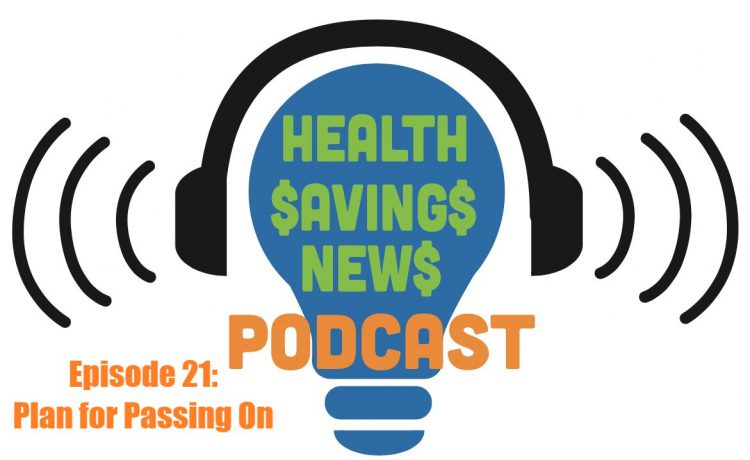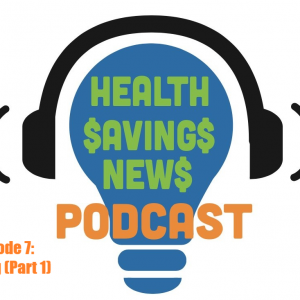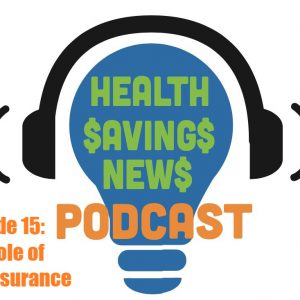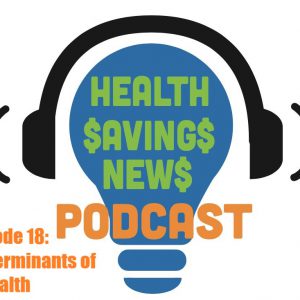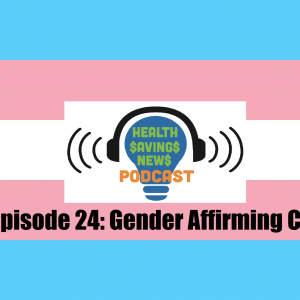Last Updated on February 16, 2023
Note: This is a rough transcript of episode 21 of Health Savings News and has been lightly edited for clarity. Copy may not be in its final form.
Evan (00:09):
Hello and welcome to Health Savings News, the podcast about healthcare costs in America and how to save money on the often expensive care all kinds of people need. I’m your host, Evan O’Connor, joined by retired doctors Rich Sagall and Mike Woods. How are you guys doing today?
Mike (00:23):
Good.
Rich (00:24):
Doing well.
Evan (00:25):
Good to hear. Each episode we discuss healthcare costs in America, offer our tips for saving money, and relevant news that affects and reflects the expensive landscape of healthcare in America. This week’s topic is end of life planning. We want to give a content warning for this topic as we’ll be talking about death, financial consequences, and sensitive health subjects that may be upsetting to some listeners. We encourage everyone listening to make individual and healthy decisions about how and if you should consume this podcast.
End of life planning is the process of making decisions and getting affairs in order and preparation for when you or a loved one passes away. This includes important decisions about property, healthcare, finances, and more. These tasks can be emotional and laborious, but the consequences of not having plans in place can lead to unwanted medical care, lack of control over who receives your property after you die, or even your final resting place. As mentioned in previous episodes, NeedyMed has a website that serves as a comprehensive resource of the end of life planning called Plan for Passing On. Our very own Mike Woods did all the research necessary for putting this project together. This will be different from some of the other podcasts we’ve done in the past, where Rich will be asking Mike questions about his process of putting the project together and how it can be useful to people in need.
Rich (01:42):
So let me start with, what is the Plan for Passing On website?
Mike (01:46):
Well, the is a site is primarily there to help people plan for the ultimate fate of death. It is both for individuals and loved ones who may be dealing with your passing on or the process that occurs after your death, guides the visitors through options for the many decisions that are needed to make around this difficult time, and it makes people aware of all the necessities of the end of life planning. I was surprised to find how many of them are necessary. And it is a very, very complex and detailed situation that this website helps us to sort out. One thing this website is not for is: I am not a professional in any means in terms of legal, financial, or other type of advice. So this information is all intended for knowledge only and not to be construed as any sort of advice specifically from me or anyone else contributing to the website.
Rich (02:50):
Thanks, Mike.
Mike (02:51):
I will in turn ask a question.
Rich:
Okay.
Mike:
Since it wasn’t my idea to do the website, it was actually Rich’s. So I would like Rich to explain the process of how this site came to be.
Rich (03:05):
I came across a website to talk about Viatical settlements. It’s something that I’d never heard about. Did a little reading, and thought this is something other people needed to know about. I discussed it with Mike who picked up the mantle and ran with it. And then we end up with a very extensive and comprehensive website, which Mike is the master of.
Mike (03:25):
Yeah. Viatical settlements turn out to be just turning in your life insurance policies to particular companies who will give you back a portion of that money that you can use if you’re in an end of life situation. So that’s how the concept of Viatical settlements , which is essentially an end of life decision, evolved into this huge project to cover basically all of the aspects of end of life decisions that we could think of talking about.
Rich (03:57):
Now, we’ve talked a little bit about this already, but what do you feel makes this site unique?
Mike (04:02):
Well, having done the research I realized that there’s a ton of information out there on end of life decisions and other things for planning for your passing on, but it is so scattered, and it took me two or three years to take all the various sources of information and put it together in one location. So this site now contains the whole gamut of decision making processes and options available to you from financial to emotional, to practical steps to take all in one place. And on the plus side, this is a free website, and we’re really not trying to sell you anything. It’s just yours to use and no strings attached.
Rich (04:50):
Now, Evan mentioned who the website was for, but can we go over that again?
Mike (04:54):
Sure. Basically the website is for anyone. Majority of the website is devoted to what to do prior to death when planning for passing on. So basically, any adult will find most of the information in this website helpful. It’s especially helpful for those who are dealing with a chronic or terminal illness because there are some sections that specifically deal with people who are actually going to experience an imminent death. It’s also for family members. One of the things that’s very important that I encourage throughout the site is for families to work together on looking at all this information and making these decisions so that when the time comes, everybody’s pretty much on the same page, and a lot of the turmoil that can be associated with end of life situations can be avoided. After death, there’s an entire section that’s on devoted to everything that a loved one needs who have just experienced someone’s death, whether it’s dealing with it emotionally or a checklist of all the little things that need to be done after somebody has died.
Rich (06:08):
Now you have a lot of material in this site. What do you do to ensure accuracy in keeping it current?
Mike (06:14):
Yeah, again, I want to stress the fact that I’m a physician and not an expert in any of these other areas that we talk about. So it really comes down to a careful choice of references. Basically, I looked for sites that were created by professional organizations, government websites, or any other credible organization with a good reputation. For instance, a lot of the information is from medical specialties sites like the American Cancer Society, which deals a lot with the issue of, of passing on and other associations associated with chronic illnesses like ALS and other diseases like that that frequently result in early deaths. When you get down to the article itself, you want to make sure that the article is either written or reviewed by an expert in that field, which I made great pains to try to do. I used many articles for each of the topics and made sure that there was a general agreement between the articles on the information that they were presented. It became very difficult, and when there was some disagreement you had to go and look into a lot more references before you could finally get a consensus opinion in enough detail to be able to present it on the site. In some cases, if I couldn’t resolve any differences, we just didn’t talk about it on the website. I also review the sites every year. So I go through all of the references, read through all of the, the sections, make any corrections that were missed the first time around any updates that have occurred since the previous year, and make sure that all of the references either stay updated, which a lot of websites do do, or if the websites or information is getting too old, I replace it with more recent information. And finally, I try to keep track of some websites that talk about these issues. And if I come across articles that talk about issues that we cover in the site I will add them to the website. For instance, I got some information recently on how to deal with pets of somebody that has died. And I added that to the site, and I will continue to do that with everyth things that I come across or other people refer to me.
Rich (08:41):
Like many of the projects we have here at NeedyMeds, it’s a compilation of existing information. We just bring it all to you in one place.
Mike (08:49):
Exactly.
Rich (08:51):
And we also depend upon people who use our site. If you, in reading the sections of the site, find something that was omitted, you can let us know. And Evan, what’s the best email address to use for that?
Evan (09:05):
You can send corrections or other things we missed to info@needymeds.org.
Rich (09:11):
Now, Mike, what do you think is the most important section if someone’s only gonna read one part of the website?
Mike (09:17):
Well, given my perspective as a physician, the section that I think is most important for people is the Respecting Your Wishes section. This really discusses all of the things you need to know about making, communicating, and assuring that any choices that you’ve made about your own death will be made by others if you are unable to about the time of your death. So there are many things that are important for you to think about before you die. And one of them is, “what happens if I can no longer make decisions?” The most important thing in that context is what’s called a healthcare proxy or healthcare power of attorney, who is someone you trust to make those decisions that you have decided on if you are no longer able to. You can also create documents that will also state some of these preferences. The most important ones are called the Advance Care Directives. They’re composed of three different things. One is a living will. A living will basically summarizes your feelings about advanced care such as life support, et cetera, that you may or may not want. For instance a lot of people insist that they don’t want to be intubated. That would be something that would be included in a living will. Other people will also not want to use particular resuscitative medications, don’t want to go on dialysis, or other things like that. So a living will is your means of expressing all of these end of life care decisions that you would either want or not want to have when that situation comes around.
Two specific documents are the Do Not Resuscitate (DNR). This is a document that tells specifically what you want to do if you, your heart stops and you start breathing. In most cases, if a person has a cardio respiratory arrest in a non-hospital situation, CPR or anything that an emergency medical technician can do is basically not gonna work. Even in hospital situations, the type of resuscitation that you would think of, which is intubation and chest compressions really don’t work for most people. So it’s very important for you to think about what your preferences are for that. The other is called a Physician Orders for Life Sustaining Treatment (POLST). Unlike a living will, this is a document that is written by your physician and is, are actually legal orders of what sort of medical treatments you do or do not want at the time of death, or at a time where you are no longer able to make those decisions. Being a legal document, it can go anywhere with you. It can even go with you into the hospital and be put in your hospital orders so that the staff knows how to deal with different situations and your home. If you, if you want to make sure that EMTs who come and respond to your death know what not to do, both a DNR order and a POLST should be posted on bright paper in a clear location in your house usually on a refrigerator. The Physicians Order for Lifesaving Treatment is called different things in different states. So you will need to look up your state’s name for that particular program. And finally, another thing to plan ahead is a lot of people have very specific feelings about what they want for their funeral, their memorial mass, and how they want their remains disposed of. So these are very good issues to again, think and plan ahead so that others know what to do once this happens.
Rich (13:32):
I want to emphasize that it’s important to make sure anyone who might be involved in your final care or have a stake in things after you’re gone, be made aware of all the things that Mike just discussed.
Mike (13:47):
Yes. And that’s one of the reasons why I emphasize that they should be discussed together so that anyone who is made aware of this stuff they,… I dunno if the right word is convince them, but they basically have agreed that they will follow your directions.
Rich (14:09):
Most physicians have had the experience of a well-planned end of life, and then a relative or offspring from away comes into town and wants everything done. And that makes it very difficult. And that’s why it’s important to, as Mike said, to have everyone become aware of what your wishes are.
Mike (14:27):
Yep. And as best as possible, agree to the terms that you are putting down.
Rich (14:33):
Right. Moving on, what are some other important sections of this website?
Mike (14:39):
Well, one of the things that, that most people think about but are surprisingly high percentages of them don’t, is a last will and testament. Everybody, you know, has an idea of, of what they want to happen to their estate, their properties, their gadgets, you know, their trinkets and whatever. But most people don’t get around to doing it. Now, what happens if you don’t do that is that the probate court in your local region takes over control of the disposition of your estate. So it is extremely important that if you do nothing else, look at the Last Will and Testament section and make it a major part of your planning for the end of your life. You really want everything to go according to wishes.
There’s another section that’s actually helpful for both families and individuals. It’s called Easing Your Passage. Dying is… obviously it’s inevitable but it doesn’t have to be as stressful a process as most people think about. There are a lot of ways to make an end of life easier, both through emotional support and through medical support, such as you would see through organizations like hospice that make the end of life process a more dignified process than might otherwise happen if for, say, like we talked about before, you know, you don’t have a DNR or physician’s orders to not start particular life support. So it’s a very undignified thing for those things to happen when you really don’t want them to. So that’s what hospice helps you do, is it guides you away from treatments that may no longer be working or causing too many side effects or pain or debilitation or whatever, and guides you to more to, to more care that’s more comfortable and gives you a more dignified death.
There’s a large section we talked about briefly. It’s called Information for Families, and it really goes into the details about how to deal with a loved one when they are dying, both emotionally and physically. There’s a section on dealing with your own emotions, such as grief, anger that you will see after a loved one has died. And finally there’s a section that really is all the minute details that need to be done after a person has died and I’ve broken it down into sections of things that you need to do immediately, things that need to be done within a few days, and then things that can be put off for a little while longer. One of the things that is, the questions that a lot of people have are a lot of older folks are on multiple medications, and it’s hard to know what to do with the medication so there’s an entire section on dealing with unused medication. In this time everybody’s life is online and there’s a whole host of digital things to deal with, whether it be closing down email accounts, radio accounts, TV subscriptions, et cetera. So there’s a huge section on the digital world that tells you how to terminate contracts with television, sports networks, magazines, et cetera, that’s worth looking at.
There’s also a large section on financing. Two of the sections, annuities and IRAs are really just a condensed version of retirement planning. And again, that’s useful for anyone pretty much at any age that plans for retirement. However, in that section there’s also a specific section called Managing Finances with a tTrminal Illness. There’s just a lot of decisions that need to be made, that you can make to reduce costs and manage money when you are dying. A lot of it depends on how much life expectancy you have, obviously your own personal finances and other preferences that you may have toward the end of life, and that’s where the viatical settlements first contributed to that. Cuz one of the financial management you might want to do at the end of life is to turn in your life insurance policy to get your viatical settlement and use it for something that will enrich your life or make you happy, although it can also be used to pay for medical bills if necessary.
Rich (19:38):
Are there significant consequences of not following some of these steps that you just described?
Mike (19:43):
Yeah. Evan mentioned a couple of them. You know, one is— and we’ve talked about it, you know— without all the things you, you end up with a lot of unnecessary end of life care. We talked about dying without a will, where your entire estate is left up to a decision to be made by a local court. Most of the time, those decisions that are made would have been the ones you would’ve made anyway, but each state is slightly different as far as how your state is broken up in terms of your wife, your children, your parents, your siblings. Each state has their own way of doing it. The section on intestate succession, which is a legal term for dying without a will, will give you all the details of what potentially will happen if you die without a will.
One of the common problems with end of life issues is that a significant percentage of people and families who are experiencing an end of life situation go into debt. In some cases, really deep debt. So some of the sections we have will discuss ways of, again, cutting back on some of the costs, how to cut costs for funerals, how to cut costs for end of life medical care, some ways to decrease the risk of debt, and even ways of cutting down on how many, how many taxes you have to pay the government for your estate when you die.
Rich (21:28):
I want to add one important decision that’s probably one of the most difficult that people have to make, is if you have minor children and something happens to both parents, who do you want to be responsible for the children and raising them? There is no one right answer, of course, but it’s something that needs to be discussed and documented so people know.
Mike (21:50):
Yeah, there is a whole section in the website under the estate basics called Beneficiaries, and it really goes into some of the details of, you know, what happens if you don’t choose beneficiaries or, you know, what actually beneficiaries are or how to use your estate planning to benefit your beneficiaries. There’s also a section on inheritance law that also goes into some of the things that may happen if you don’t make plans for minor children and how, again, the probate court will step in and make those kind of decisions. So as Rich said, you know, when you have minor children, yes, it adds a whole level of complexity to your estate plan, and it’s not anything that you want the probate court to be involved in. So I very much recommend looking through the site and making sure that you do what’s appropriate to make sure that your minor children are taken care of if both of the parents die.
Rich (22:57):
Couple of other minor points, maybe not so minor, is once you’ve made the decision, you want to try to make sure that no testing is done, where you’re not going to use the results. As a personal example, my mother was in a nursing home and declining fast. They took her blood pressure, which was low, and called the doctor on call, and she was rushed the emergency room for evaluation. She was a DNR. There was no reason for her to go to the hospital. And I had to argue with the staff. And finally we came to a compromise where they were just not gonna take her vital signs any longer because we’re not gonna do anything. But these are the sorts of issues that you need to consider. And it may become very difficult if the loved one is in a care facility.
Mike (23:42):
Right. Which falls back into my previous statement about how the debt associated with dying can get out of hand if things are not done properly, or DNR orders are ignored, or people aren’t aware of what your decisions or choices are ahead of time.
I just want to stress that actually one of the biggest sections, or maybe the biggest section in the website is called Estate Planning. It’s only slightly associated with the whole plan for passing on, but it is an extremely important part of everybody’s planning both when they are younger, as well as approaching the end of their life to make sure that their estate ends up exactly where you want it to be in an effective and cost effective way. Again, there are plenty of experts that can help you with that and, again, I encourage you to read the section and use the appropriate professional to make these details. Just want to say one thing is there’s a section on trusts. My initial thought when I started doing this website is, trusts are only for the very wealthy. And it turns out that that’s not really true. Even those of us with modest incomes or savings can benefit from trusts. So again, a very important section to look over and not to be ignored, even if you have a modest income or savings.
Rich (25:21):
You’ve covered a lot of information, Mike. Where can people find more details?
Mike (25:28):
Basically, you can, obviously, the website goes into much more detail than we’ve presented here. However, I’ve listed resources or ways of finding additional details. One of the most important things is you’ll notice that each of the reference lists are quite long. When you use a reference for a site like this, you obviously can’t take out all of the details in that reference. So in a lot of cases, if you look through the reference list, you can find some of the articles that are very detailed, and if you’re interested in pursuing that either level of detail on that particular subject or just for additional knowledge, that’s a good place to look. There’s also links within the website anytime you see blue highlighted, there’s a link either to a particular section and plan for passing on that has more detail about that particular subject or what’s called an outlink, which will link you to additional information if I felt that it was too detailed to go into within the site. But it gives you the opportunity to link out. And in a lot of cases when you’re reading a website like this, you come across terms and concepts that you really aren’t familiar with. So in a lot of cases where I came across those types of situations, I created a link to either a dictionary, law dictionary website or other article that will describe that concept or that term in detail so that you understand how it fits in the context of the website. And finally a lot of sections have resource lists. These are there for two specific reasons. One there are links to additional information. Most of them are pamphlets published by certain societies where you can download a PDF and others are just practical information on how to do things. So for instance you might want to look up, you know, the local funeral sites. There’s a website in that section. There’s a resource or a couple of resources in that section that will allow you to do that. And these sort of resource lists are scattered throughout the site and very useful.
Rich (28:08):
Well, I think that wraps it up, Mike. I have a couple of questions. Maybe Evan’s the best one to answer these. How can listeners learn of new information we’ve added to the website?
Evan (28:18):
If you want to be notified when information is updated, you can sign up for Plan for Passing On emails from the bottom of the Plan for Passing On website at planforpassingon.org.
[segment break]
The last segment of each episode, we suggest some of the culture, art, entertainment, and social causes we’ve been engaged with to each other and our listeners. This is a pretty heavy episode, so I’m going to suggest a podcast called Sawbones: A Marital Tour of Misguided Medicine, hosted by Dr. Sydnee McElroy and her husband Justin McElroy. Most people listening to podcasts are probably familiar with some of the McElroy shows. In Sawbones, each episode Sydnee discusses an element of historical medical practice, generally the weird, dumb and wrong ways people have tried to fix one another while Justin provides a comedic foil. They’ve had a lot of really great episodes about historical anachronisms and also important things like abortion.
Thank you so much for joining us for this episode of Health Savings News. Please subscribe, rate, and review us on Apple Podcast or wherever you’re listening to the show — it really does help. You can follow @NeedyMeds on Facebook, Instagram, LinkedIn, YouTube, Mastodon, and you can follow @HealthSavingPod on Twitter (for as long as Twitter remains around) for updates specific to this podcast and send questions, comments, and topic suggestions to podcast@needymeds.org. Our music is composed by Samuel Rulon Miller. His music can be found at musicisadirtyword.bandcamp.com. The Health Savings News podcast is produced by me, Evan O’Connor. All the sources we use in our research can be found in this episode’s podcast description on our website or your podcast of choice. Health Savings News is not intended to substitute professional medical, financial, or legal advice. Always seek the advice of a qualified healthcare professional or appropriate professional. With any questions, view, express and Health Savings News are solely those of the individual expressing them. Any views expressed do not necessarily represent the views of Health Savings News, other contributors, the NeedyMeds organization or staff. Thanks again for listening. We’ll see you in two weeks with our next episode.
Sources:

